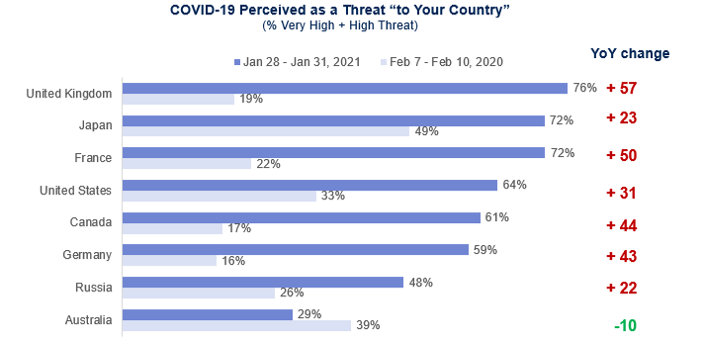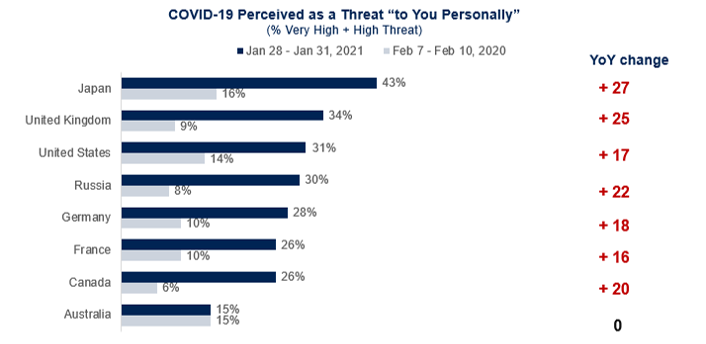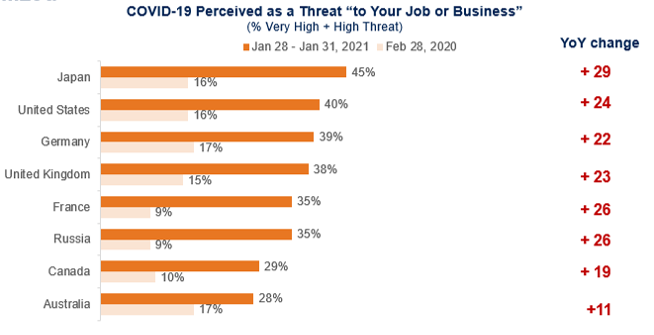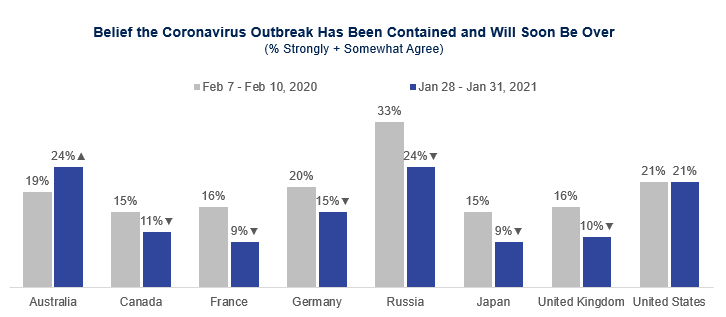One year on, most don’t see an end to the pandemic before the end of 2021 – if at all
Washington, DC, February 25, 2021 — As the world marks one year of living with COVID-19, an analysis of Ipsos tracking data from eight countries examines how perceptions of the virus have changed since the beginning of the pandemic. In Australia, Canada, France, Germany, Japan, Russia, the United Kingdom, and the United States, people tend to see COVID-19 as a greater threat to their country than to their jobs or to their safety, something that's remained constant for much of the pandemic. Looking ahead, few believe they are out of the woods yet; most expect the virus will not be contained until the second half of 2021, if ever.
COVID-19 as a national threat
In all eight countries surveyed, more people think of COVID-19 as a “high” or “very high” threat to their country than to their job or business or to themselves personally.
- As of now, the United Kingdom (76%), Japan (72%), and France (72%) are the countries whose citizens are most concerned about the threat COVID-19 poses to their nation, followed by the United States (64%), Canada (61%), Germany (59%), Russia (48%), and Australia (29%).
- Compared to one year ago, the view that the pandemic is endangering one’s country has gained the most ground in the U.K. (+57 percentage points), France (+50), Canada (+44), and Germany (+43).
- Year-over-year, perceptions of the virus as a national threat have not grown as much in the U.S. (+31), Japan (+23), and Russia (+22), and have receded in Australia (-10) – the four countries where they were highest a year ago.

- Among the eight countries surveyed, the U.K. is the only one where the perception of COVID as a threat to the nation is close to its pandemic record – only 3 points lower than in late March-early April 2020 and higher than at any time since then. By contrast, in Australia, it is now 45 points lower today than in late March. Elsewhere, it is about 15 points lower than at its peak in March or April. However, it is now at its highest in Germany (last peak in April) and in France (previous high in early November).
COVID-19 as a personal threat
In almost all countries, more feel personally threatened by COVID-19 today than they did a year ago. However, citizens viewing the pandemic as a “high” or “very high” threat to themselves do not make up a majority in any of the eight countries surveyed.
- Concern about one’s personal safety is highest in Japan (43%), where it has grown the most (+27 points).
- It is lowest in Australia (15%), where it is exactly at the same level as one year ago.
- In all six other countries, perceptions of COVID-19 as a threat are in the 26%-34% range, about 20 points higher than a year ago.

- Since peaking in March-April 2020, concern about COVID as a personal threat has receded the most in Australia (down 21 points) and France (down 16). In other countries, it is down by 5 to 11 points since that time. However, it is now at its highest since early May both in the U.K and Japan. In Russia, it is now 8 points lower than during the country’s second peak in mid-December.
COVID-19 as a threat to one’s job or business
Perceptions of COVID-19 as a threat to one’s job or business are more prevalent today in every single country than they were a year ago.
- Concern about COVID putting one’s livelihood at risk ranges from 45% in Japan and 40% in the U.S to 29% in Canada and 28% in Australia.
- It shows a year-on-year increase of 19 to 29 points in all countries surveyed except Australia (+11).

- In all countries, the perception that COVID is a threat to one’s job or business peaked in March or April 2020, although it crested a second time in mid-December in Russia. Compared to its pandemic high, it is down most in Australia (-26), Canada (-23), and France (-21). Elsewhere, it is now only 10 to 15 points lower.
Expectations for the future
Not many people believe the virus is contained, dampening expectations for the future.
- In nearly all countries, the share of people who believe the coronavirus pandemic will soon be over is lower now than a year ago, ranging from 24% in Australia and Russia to just 15% in Canada and Japan. This is true for all countries, except for Australia, where more people now believe the pandemic will be over soon, and the United States, where it is unchanged.

Looking ahead, people are not optimistic about the timeline for the pandemic. Large majorities in all countries still feel it will be at least until the second half of 2021 before it’s contained – if ever.
- Those who expect the virus to be contained within the next six months range from 30% in the U.S., 25% in Germany, and 24% in Australia to just 7% in Japan.
- More than one-third in Japan (37%) and about one-quarter in France (26%) and Australia (24%) believe COVID-19 will never be contained.
About the Study
The survey is conducted on Ipsos’ Global Advisor online platform among adults aged 18-74 in Canada and the United States, and 16-74 in Australia, France, Germany, Japan, Russia, and the United Kingdom.
The first wave was conducted between February 7-10, 2020. The 33rd and most recent wave reported in this document was conducted January 28-31, 2021.
For each of Australia, Canada, France, Germany, Japan, the U.K., and the U.S., the samples of each survey wave have a size of 1,000 and can be taken as representative of the country’s general adult population aged 16-74 or, for the US and Canada, aged 18-74.
For Russia, the samples of all survey waves conducted between February and July 2020 size have a size of approximately 1,000 while those of waves conducted since August 2020 have a size of approximately 500. The samples in Russia are more urban, more educated, and/or more affluent than the general population and should be viewed as reflecting the views of the more “connected” segment of the population.
The data is weighted so that each country’s sample composition best reflects the demographic profile of the adult population according to the most recent census data.
Where results do not sum up to 100 or the ‘difference’ appears to be +/-1 more/less than the actual, this may be due to rounding, multiple responses, or the exclusion of “don't know” or not stated responses.
The precision of Ipsos online polls is calculated using a credibility interval with a poll of 1,000 accurate to +/- 3.5 percentage points and of 500 accurate to +/- 4.8 percentage points.
For more information on Ipsos’ use of credibility intervals, please visit the Ipsos website (www.ipsos.com).
The publication of these findings abides by local rules and regulations.
